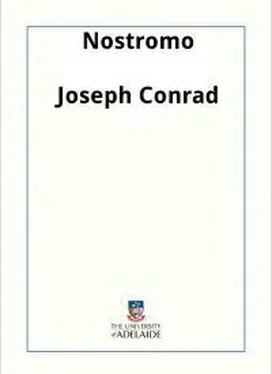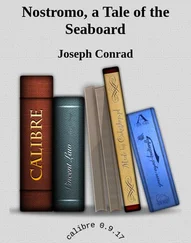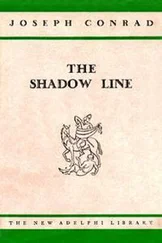Джозеф Конрад - Nostromo - A Tale of the Seaboard
Здесь есть возможность читать онлайн «Джозеф Конрад - Nostromo - A Tale of the Seaboard» весь текст электронной книги совершенно бесплатно (целиком полную версию без сокращений). В некоторых случаях можно слушать аудио, скачать через торрент в формате fb2 и присутствует краткое содержание. Год выпуска: 2006, Жанр: Классическая проза, на английском языке. Описание произведения, (предисловие) а так же отзывы посетителей доступны на портале библиотеки ЛибКат.
- Название:Nostromo: A Tale of the Seaboard
- Автор:
- Жанр:
- Год:2006
- ISBN:нет данных
- Рейтинг книги:4 / 5. Голосов: 1
-
Избранное:Добавить в избранное
- Отзывы:
-
Ваша оценка:
- 80
- 1
- 2
- 3
- 4
- 5
Nostromo: A Tale of the Seaboard: краткое содержание, описание и аннотация
Предлагаем к чтению аннотацию, описание, краткое содержание или предисловие (зависит от того, что написал сам автор книги «Nostromo: A Tale of the Seaboard»). Если вы не нашли необходимую информацию о книге — напишите в комментариях, мы постараемся отыскать её.
Nostromo: A Tale of the Seaboard — читать онлайн бесплатно полную книгу (весь текст) целиком
Ниже представлен текст книги, разбитый по страницам. Система сохранения места последней прочитанной страницы, позволяет с удобством читать онлайн бесплатно книгу «Nostromo: A Tale of the Seaboard», без необходимости каждый раз заново искать на чём Вы остановились. Поставьте закладку, и сможете в любой момент перейти на страницу, на которой закончили чтение.
Интервал:
Закладка:
Nostromo, the miscalled Capataz de Cargadores, had made for himself, under his rightful name, another public existence, but modified by the new conditions, less picturesque, more difficult to keep up in the increased size and varied population of Sulaco, the progressive capital of the Occidental Republic.
Captain Fidanza, unpicturesque, but always a little mysterious, was recognized quite sufficiently under the lofty glass and iron roof of the Sulaco railway station. He took a local train, and got out in Rincon, where he visited the widow of the Cargador who had died of his wounds (at the dawn of the New Era, like Don Jose Avellanos) in the patio of the Casa Gould. He consented to sit down and drink a glass of cool lemonade in the hut, while the woman, standing up, poured a perfect torrent of words to which he did not listen. He left some money with her, as usual. The orphaned children, growing up and well schooled, calling him uncle, clamoured for his blessing. He gave that, too; and in the doorway paused for a moment to look at the flat face of the San Tome mountain with a faint frown. This slight contraction of his bronzed brow casting a marked tinge of severity upon his usual unbending expression, was observed at the Lodge which he attended—but went away before the banquet. He wore it at the meeting of some good comrades, Italians and Occidentals, assembled in his honour under the presidency of an indigent, sickly, somewhat hunchbacked little photographer, with a white face and a magnanimous soul dyed crimson by a bloodthirsty hate of all capitalists, oppressors of the two hemispheres. The heroic Giorgio Viola, old revolutionist, would have understood nothing of his opening speech; and Captain Fidanza, lavishly generous as usual to some poor comrades, made no speech at all. He had listened, frowning, with his mind far away, and walked off unapproachable, silent, like a man full of cares.
His frown deepened as, in the early morning, he watched the stone-masons go off to the Great Isabel, in lighters loaded with squared blocks of stone, enough to add another course to the squat light-tower. That was the rate of the work. One course per day.
And Captain Fidanza meditated. The presence of strangers on the island would cut him completely off the treasure. It had been difficult and dangerous enough before. He was afraid, and he was angry. He thought with the resolution of a master and the cunning of a cowed slave. Then he went ashore.
He was a man of resource and ingenuity; and, as usual, the expedient he found at a critical moment was effective enough to alter the situation radically. He had the gift of evolving safety out of the very danger, this incomparable Nostromo, this “fellow in a thousand.” With Giorgio established on the Great Isabel, there would be no need for concealment. He would be able to go openly, in daylight, to see his daughters—one of his daughters—and stay late talking to the old Garibaldino. Then in the dark . . . Night after night . . . He would dare to grow rich quicker now. He yearned to clasp, embrace, absorb, subjugate in unquestioned possession this treasure, whose tyranny had weighed upon his mind, his actions, his very sleep.
He went to see his friend Captain Mitchell—and the thing was done as Dr. Monygham had related to Mrs. Gould. When the project was mooted to the Garibaldino, something like the faint reflection, the dim ghost of a very ancient smile, stole under the white and enormous moustaches of the old hater of kings and ministers. His daughters were the object of his anxious care. The younger, especially. Linda, with her mother’s voice, had taken more her mother’s place. Her deep, vibrating “Eh, Padre?” seemed, but for the change of the word, the very echo of the impassioned, remonstrating “Eh, Giorgio?” of poor Signora Teresa. It was his fixed opinion that the town was no proper place for his girls. The infatuated but guileless Ramirez was the object of his profound aversion, as resuming the sins of the country whose people were blind, vile esclavos.
On his return from his next voyage, Captain Fidanza found the Violas settled in the light-keeper’s cottage. His knowledge of Giorgio’s idiosyncrasies had not played him false. The Garibaldino had refused to entertain the idea of any companion whatever, except his girls. And Captain Mitchell, anxious to please his poor Nostromo, with that felicity of inspiration which only true affection can give, had formally appointed Linda Viola as under-keeper of the Isabel’s Light.
“The light is private property,” he used to explain. “It belongs to my Company. I’ve the power to nominate whom I like, and Viola it shall be. It’s about the only thing Nostromo—a man worth his weight in gold, mind you—has ever asked me to do for him.”
Directly his schooner was anchored opposite the New Custom House, with its sham air of a Greek temple, flatroofed, with a colonnade, Captain Fidanza went pulling his small boat out of the harbour, bound for the Great Isabel, openly in the light of a declining day, before all men’s eyes, with a sense of having mastered the fates. He must establish a regular position. He would ask him for his daughter now. He thought of Giselle as he pulled. Linda loved him, perhaps, but the old man would be glad to keep the elder, who had his wife’s voice.
He did not pull for the narrow strand where he had landed with Decoud, and afterwards alone on his first visit to the treasure. He made for the beach at the other end, and walked up the regular and gentle slope of the wedge-shaped island. Giorgio Viola, whom he saw from afar, sitting on a bench under the front wall of the cottage, lifted his arm slightly to his loud hail. He walked up. Neither of the girls appeared.
“It is good here,” said the old man, in his austere, far-away manner.
Nostromo nodded; then, after a short silence—
“You saw my schooner pass in not two hours ago? Do you know why I am here before, so to speak, my anchor has fairly bitten into the ground of this port of Sulaco?”
“You are welcome like a son,” the old man declared, quietly, staring away upon the sea.
“Ah! thy son. I know. I am what thy son would have been. It is well, viejo. It is a very good welcome. Listen, I have come to ask you for——”
A sudden dread came upon the fearless and incorruptible Nostromo. He dared not utter the name in his mind. The slight pause only imparted a marked weight and solemnity to the changed end of the phrase.
“For my wife!” . . . His heart was beating fast. “It is time you——”
The Garibaldino arrested him with an extended arm. “That was left for you to judge.”
He got up slowly. His beard, unclipped since Teresa’s death, thick, snow-white, covered his powerful chest. He turned his head to the door, and called out in his strong voice—
“Linda.”
Her answer came sharp and faint from within; and the appalled Nostromo stood up, too, but remained mute, gazing at the door. He was afraid. He was not afraid of being refused the girl he loved—no mere refusal could stand between him and a woman he desired—but the shining spectre of the treasure rose before him, claiming his allegiance in a silence that could not be gainsaid. He was afraid, because, neither dead nor alive, like the Gringos on Azuera, he belonged body and soul to the unlawfulness of his audacity. He was afraid of being forbidden the island. He was afraid, and said nothing.
Seeing the two men standing up side by side to await her, Linda stopped in the doorway. Nothing could alter the passionate dead whiteness of her face; but her black eyes seemed to catch and concentrate all the light of the low sun in a flaming spark within the black depths, covered at once by the slow descent of heavy eyelids.
“Behold thy husband, master, and benefactor.” Old Viola’s voice resounded with a force that seemed to fill the whole gulf.
Читать дальшеИнтервал:
Закладка:
Похожие книги на «Nostromo: A Tale of the Seaboard»
Представляем Вашему вниманию похожие книги на «Nostromo: A Tale of the Seaboard» списком для выбора. Мы отобрали схожую по названию и смыслу литературу в надежде предоставить читателям больше вариантов отыскать новые, интересные, ещё непрочитанные произведения.
Обсуждение, отзывы о книге «Nostromo: A Tale of the Seaboard» и просто собственные мнения читателей. Оставьте ваши комментарии, напишите, что Вы думаете о произведении, его смысле или главных героях. Укажите что конкретно понравилось, а что нет, и почему Вы так считаете.












